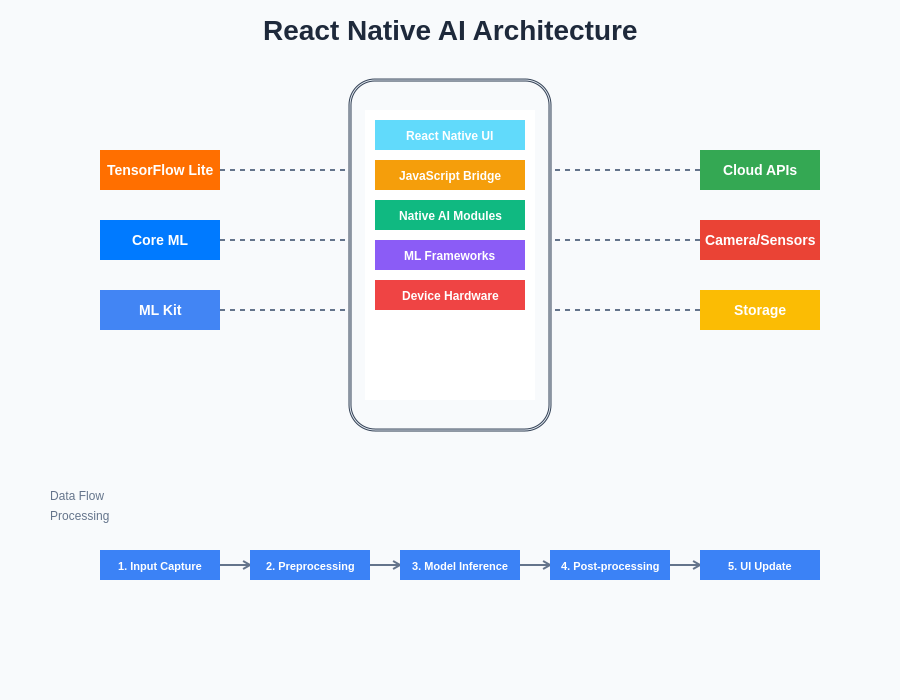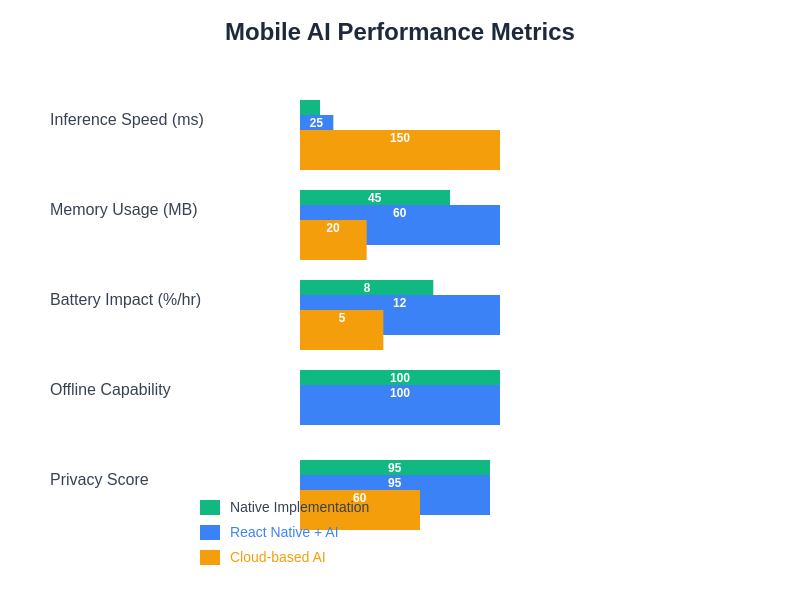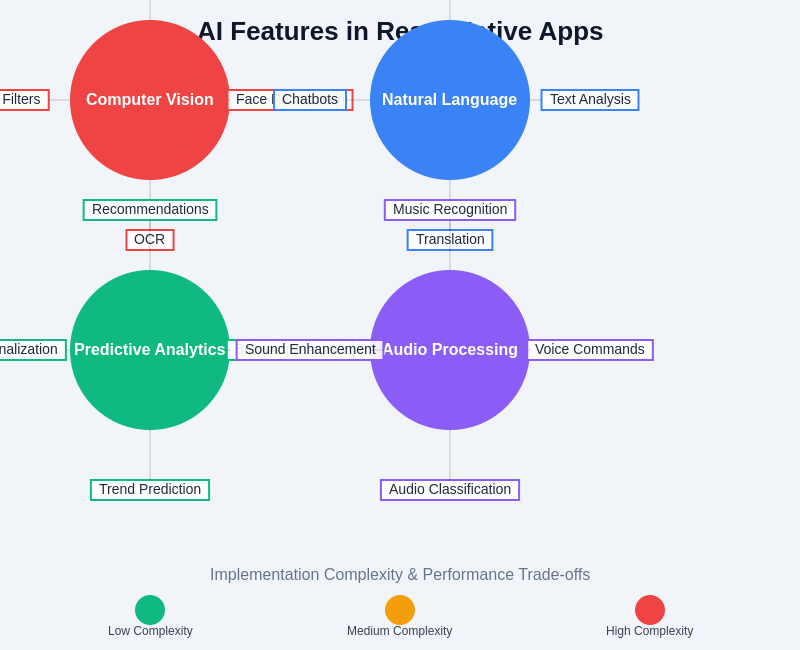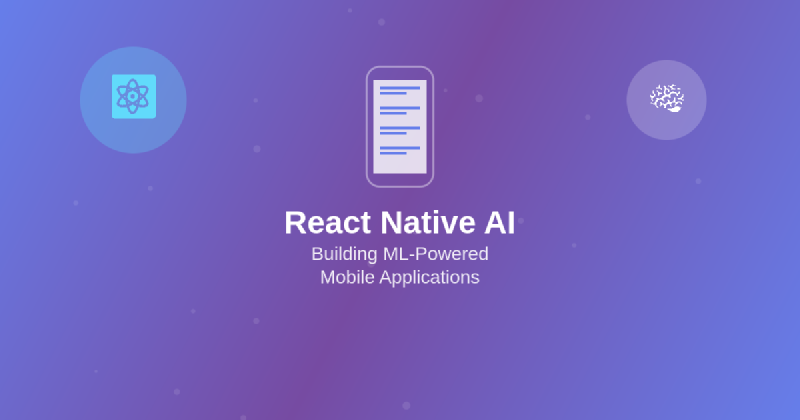The convergence of artificial intelligence and mobile application development has created unprecedented opportunities for developers to create intelligent, responsive, and personalized user experiences. React Native, with its cross-platform capabilities and robust ecosystem, has emerged as a powerful framework for building mobile applications that seamlessly integrate machine learning and artificial intelligence features. This technological marriage enables developers to harness the computational power of modern mobile devices while delivering sophisticated AI-driven functionalities that were once exclusive to cloud-based solutions.
Explore the latest AI development trends to understand how mobile AI is reshaping user interactions and creating new possibilities for intelligent mobile applications. The integration of AI into mobile applications represents a fundamental shift in how users interact with technology, moving from simple reactive interfaces to predictive, adaptive, and contextually aware experiences that learn from user behavior and environmental factors.
The Evolution of Mobile AI with React Native
React Native has evolved from a simple cross-platform development framework to a sophisticated platform capable of supporting complex artificial intelligence and machine learning workloads. The framework’s JavaScript bridge architecture, combined with native module capabilities, provides developers with the flexibility to integrate powerful AI libraries and frameworks while maintaining the performance characteristics essential for real-time machine learning inference on mobile devices.
The ecosystem surrounding React Native AI development has matured significantly, with dedicated libraries, tools, and frameworks specifically designed to facilitate the integration of machine learning models into mobile applications. This evolution has democratized AI development for mobile platforms, enabling developers with traditional web development backgrounds to create sophisticated intelligent applications without requiring deep expertise in native iOS or Android development.
Core Technologies and Frameworks
The foundation of React Native AI development rests upon several key technologies and frameworks that enable seamless integration of machine learning capabilities into mobile applications. TensorFlow Lite serves as one of the primary frameworks for on-device inference, providing optimized machine learning models that can run efficiently on mobile hardware. The framework’s lightweight architecture and support for quantization techniques ensure that complex models can operate within the resource constraints of mobile devices while maintaining acceptable performance levels.
Core ML for iOS and ML Kit for Android represent platform-specific machine learning frameworks that can be integrated into React Native applications through native bridges. These frameworks provide access to hardware-accelerated machine learning capabilities, including specialized neural processing units and GPU acceleration, which are essential for computationally intensive AI operations such as real-time image recognition, natural language processing, and predictive analytics.
Experience advanced AI capabilities with Claude to understand how intelligent systems can enhance mobile application development through automated code generation, architectural guidance, and optimization recommendations. The synergy between development tools and AI assistance accelerates the creation of sophisticated mobile applications while ensuring adherence to best practices and performance optimization.
Implementing Computer Vision Features
Computer vision represents one of the most compelling applications of AI in mobile development, enabling applications to process, analyze, and understand visual information in real-time. React Native applications can leverage computer vision capabilities through various approaches, including pre-trained models for common tasks such as object detection, facial recognition, and optical character recognition, as well as custom-trained models tailored to specific use cases and requirements.
The implementation of computer vision features in React Native typically involves capturing camera input through the device’s camera API, processing the visual data through machine learning models, and presenting the results to users through intuitive interfaces. This process requires careful consideration of performance optimization techniques, including frame rate management, resolution scaling, and efficient memory usage to ensure smooth user experiences across different device capabilities and specifications.
Advanced computer vision implementations may include augmented reality features, where AI-powered object recognition and tracking enable the overlay of digital information onto real-world scenes. These applications demonstrate the potential of combining React Native’s development efficiency with powerful machine learning capabilities to create immersive and interactive user experiences that blur the boundaries between digital and physical environments.

The architectural foundation of React Native AI applications demonstrates the seamless integration between JavaScript-based application logic and native machine learning frameworks. This layered architecture enables developers to leverage powerful AI capabilities while maintaining the cross-platform benefits and development efficiency that make React Native an attractive choice for mobile development.
Natural Language Processing Integration
Natural language processing capabilities have become increasingly important in mobile applications, enabling features such as intelligent chatbots, voice assistants, sentiment analysis, and automated content generation. React Native applications can integrate NLP functionality through various approaches, including cloud-based APIs for comprehensive language understanding and on-device models for privacy-sensitive applications that require offline functionality.
The integration of speech recognition and text-to-speech capabilities enables voice-driven interfaces that provide hands-free interaction modes, particularly valuable for accessibility and automotive applications. These features can be enhanced through custom language models trained on domain-specific vocabulary and speech patterns, improving accuracy and user satisfaction for specialized use cases.
Sentiment analysis and text classification capabilities enable applications to automatically categorize user-generated content, detect emotional states, and provide personalized responses based on contextual understanding of user inputs. These features are particularly valuable for social media applications, customer service platforms, and mental health applications where understanding user sentiment and intent is crucial for appropriate response generation.
Real-Time Recommendation Systems
Recommendation systems powered by machine learning algorithms have become essential components of modern mobile applications, providing personalized content suggestions, product recommendations, and user experience optimization based on behavioral patterns and preferences. React Native applications can implement recommendation systems through various approaches, ranging from collaborative filtering algorithms to deep learning models that analyze complex user interaction patterns.
The implementation of real-time recommendation systems requires sophisticated data collection and processing pipelines that can handle streaming user interaction data while maintaining privacy and security standards. These systems must balance the need for personalization with computational efficiency, often employing techniques such as model compression and caching strategies to deliver recommendations with minimal latency.
Advanced recommendation systems may incorporate contextual factors such as location, time of day, device usage patterns, and social connections to provide more accurate and relevant suggestions. The integration of these contextual elements requires careful consideration of privacy implications and user consent mechanisms to ensure ethical and transparent use of personal data.
Enhance your development workflow with Perplexity for comprehensive research and analysis of machine learning algorithms, optimization techniques, and best practices for mobile AI implementation. The combination of powerful research tools and development frameworks creates an environment where innovation flourishes and complex AI features become accessible to broader developer communities.
Performance Optimization Strategies
Performance optimization represents a critical aspect of mobile AI development, where the constraints of mobile hardware and battery life require careful consideration of computational efficiency and resource management. React Native AI applications must employ various optimization strategies to ensure smooth user experiences while maintaining the sophistication of AI-powered features.
Model optimization techniques such as quantization, pruning, and knowledge distillation enable the deployment of complex machine learning models on mobile devices by reducing model size and computational requirements while preserving accuracy levels sufficient for practical applications. These techniques are essential for enabling real-time inference on resource-constrained devices and extending battery life through reduced computational overhead.
Memory management becomes particularly important in AI-powered applications where large models and data processing operations can quickly consume available device memory. Efficient memory allocation strategies, garbage collection optimization, and careful management of native resources through React Native bridges ensure stable application performance even during intensive AI processing operations.

Performance characteristics vary significantly between different AI implementation approaches, with native implementations offering optimal speed and efficiency, React Native solutions providing balanced performance with development productivity, and cloud-based approaches offering unlimited computational power at the cost of latency and connectivity requirements.
Security and Privacy Considerations
The integration of AI capabilities into mobile applications introduces complex security and privacy considerations that must be addressed through comprehensive security frameworks and privacy-preserving techniques. On-device processing capabilities reduce privacy risks associated with cloud-based AI services by keeping sensitive data local to the device, but require careful implementation of secure storage and processing mechanisms.
Data anonymization and differential privacy techniques enable AI applications to learn from user behavior while protecting individual privacy through mathematical guarantees of anonymity. These approaches are particularly important for applications that collect sensitive personal data such as health information, financial data, or private communications.
Model security considerations include protection against adversarial attacks, model extraction attempts, and reverse engineering efforts that could compromise proprietary AI algorithms. Secure enclave technologies and hardware-based security features available on modern mobile devices provide additional layers of protection for sensitive AI operations and data processing.
Testing and Validation Frameworks
Testing AI-powered mobile applications requires specialized frameworks and methodologies that can validate both traditional application functionality and machine learning model performance across diverse device configurations and usage scenarios. Automated testing frameworks must account for the stochastic nature of AI algorithms and provide robust validation mechanisms for model accuracy, performance, and reliability.
Integration testing becomes particularly complex in AI applications where model outputs influence application behavior and user interface elements. Testing frameworks must simulate various input conditions, edge cases, and failure scenarios to ensure graceful degradation and appropriate error handling when AI components encounter unexpected inputs or processing failures.
Performance testing for AI applications requires specialized metrics and benchmarking approaches that consider factors such as inference latency, memory usage, battery consumption, and thermal management. These testing procedures ensure that AI features provide value to users without compromising overall application performance or device usability.
Deployment and Distribution Strategies
The deployment of AI-powered React Native applications requires careful consideration of app store policies, model distribution mechanisms, and update strategies that enable continuous improvement of AI capabilities while maintaining user experience consistency. App store review processes may require additional documentation and compliance verification for applications that incorporate machine learning features, particularly those that process personal data or make automated decisions.
Model versioning and update mechanisms enable the deployment of improved AI models without requiring full application updates, providing flexibility for continuous improvement of AI capabilities based on user feedback and performance metrics. These mechanisms must balance the benefits of model updates with considerations such as download size, update frequency, and compatibility with existing application versions.
A/B testing frameworks for AI features enable data-driven optimization of model parameters, user interface elements, and feature configurations to maximize user engagement and satisfaction. These testing approaches require sophisticated analytics frameworks that can measure the impact of AI features on user behavior and application success metrics.

The comprehensive ecosystem of AI features available in React Native applications spans multiple domains, from computer vision and natural language processing to predictive analytics and audio processing. Each category offers unique opportunities for enhancing user experiences while presenting distinct implementation challenges and performance considerations.
Future Trends and Emerging Technologies
The future of React Native AI development promises even more sophisticated capabilities through emerging technologies such as federated learning, edge computing, and advanced neural network architectures. Federated learning enables collaborative model training across distributed mobile devices while preserving privacy, creating opportunities for more accurate and personalized AI models that benefit from collective intelligence without compromising individual privacy.
Edge computing capabilities continue to expand the possibilities for mobile AI applications by enabling more complex processing tasks to be performed locally on devices or through nearby edge servers. This evolution reduces latency, improves privacy, and enables AI applications to function effectively in environments with limited connectivity or bandwidth constraints.
The integration of specialized AI hardware in mobile devices, including neural processing units and advanced GPU architectures, will continue to expand the capabilities of on-device machine learning while improving energy efficiency and processing speed. These hardware advances will enable more sophisticated AI features and real-time processing capabilities that were previously impossible on mobile platforms.
Advanced neural network architectures such as transformer models, attention mechanisms, and generative AI capabilities are becoming increasingly accessible for mobile deployment through optimization techniques and specialized frameworks. These technologies will enable more sophisticated natural language processing, creative AI applications, and multimodal AI experiences that combine text, image, and audio processing capabilities.
Building Sustainable AI Ecosystems
The development of sustainable AI ecosystems within mobile applications requires consideration of long-term maintenance, scalability, and ethical implications of AI-powered features. Sustainable development practices include efficient resource utilization, responsible data collection and processing, and transparent communication with users about AI capabilities and limitations.
Community-driven development and open-source contributions play crucial roles in advancing the React Native AI ecosystem by sharing best practices, reusable components, and optimization techniques that benefit the broader developer community. These collaborative efforts accelerate innovation while ensuring that AI capabilities remain accessible to developers with varying levels of expertise and resources.
The continued evolution of React Native AI development will depend on close collaboration between framework maintainers, AI researchers, mobile platform providers, and application developers to ensure that emerging technologies are integrated effectively and responsibly into the mobile development ecosystem.
Disclaimer
This article is for informational and educational purposes only and does not constitute professional advice. The views expressed are based on current understanding of React Native AI development and mobile machine learning technologies. Readers should conduct their own research and consider their specific requirements, privacy obligations, and regulatory compliance when implementing AI features in mobile applications. The effectiveness and performance of AI implementations may vary depending on device capabilities, model complexity, and specific use cases.
